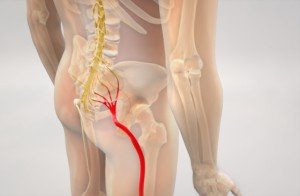
Do not confuse limbs “falling asleep” with numbness and tingling from a neuromuscular disease.
Though a neuromuscular disease may cause what’s described as “numbness and tingling” sensations, let’s focus on the phenomenon of your limbs “falling asleep.”
Causes, Solutions to Limbs Falling Asleep
In general, this is nothing to be alarmed about, especially when in many cases, it’s obvious what the cause is: pressure on a nerve from a prolonged body position.
“Limbs falling asleep can have numerous causes,” says Kathryn Boling, MD, a board certified family medicine practitioner with Mercy Medical Center in Baltimore, MD.
“For instance, numbness of the upper extremities could be caused by impingement in the nerves at the neck or anywhere from the neck to the hands.
“Sometimes impingement is caused by sleeping in one position, causing increased pressure from the mattress against parts of the arm or shoulder.
“That may cause periodic nighttime awakening during which shaking the arm and changing position quickly resolves the symptoms.”
The propensity, for lack of a better term, for a limb to fall asleep as a result of body position while sleeping is not the least bit indicative of a motor neuron or other neuro-related disease, no matter how sleepy, numb and tingly the limb is.
One time I was abruptly awakened in the middle of the night and lept out of bed to tend to my mother who was recovering from surgery.
I had no idea that in the time prior to that, while I had been asleep, my leg, too, had fallen asleep.
I had gotten out of bed so fast that I had no idea of this, and next thing I knew, my leg was collapsing under me and I fell to the floor on all fours.
Only then did I realize that the leg was entirely asleep and numb.
I carefully got back to my feet, shook it off and walked to my destination, with the numbness and tingling rapidly dissipating. And that’s the key: rapid recovery.
“Sometimes numbness and tingling of the hands can be caused by something called carpal tunnel syndrome – where there is pressure against the nerves coming into the hands at the wrists,” says Dr. Boling.
“This can be caused by repetitive motion at work such as typing. The initial treatment for this is wrist guards that hold the hand and wrist in alignment and prevent bending the wrist – especially at night.

Shutterstock/Praisaeng
“Many of us sleep with our hand beneath our head in a bent position.
“Wearing a wrist guard at night and sometimes even during the day can reduce or eliminate carpal tunnel symptoms.
“In the cases where symptoms cannot be relieved by wearing a wrist brace or better work ergonomics, surgical release of the carpal tunnel can be performed by a hand surgeon.”
Numbness and Tingling vs. Falling Asleep
Dr. Boling says, “Sometimes numbness and tingling of the extremities can be confused with a limb falling asleep. Numbness in the lower extremities can be caused by lower back injury.
“Sometimes a bulging disc or muscle spasm of the lower back and buttock can cause pressure on the sciatic nerve.
“That pressure may lead to numbness and tingling of the lower extremities.

The sciatic nerve is indicated in red. Shutterstock/Nathan Devery
“Most back problems – even bulging disks – will resolve over time. If numbness and tingling is accompanied by weakness in the lower extremities as well, MRI or consult with a back surgeon should be considered.”
Unlikely Cause of Numbness, Tingling in Limbs not Related to Falling Asleep
“Numbness and tingling can also be caused by vitamin B12 deficiency,” says Dr. Boling.

“Neurologic syphilis can also cause numbness and tingling of the lower extremities.”
Get acquainted with how it feels when a limb “falls asleep.” You should note that this proceeds pressure from a body position, and you may not realize it until you finally move the limb.
This sensation is not the same as what you’d feel if you had what Dr. Boling says is idiopathic neuropathy, which can cause numbness and tingling of the extremities, but “for some unknown reason they have nerve sensation disruption that does not have an identifiable underlying cause.
“In those cases, some patients get relief from prescription medication specifically for nerve pain.”
Diabetes can also cause neuropathy: diabetic neuropathy; nerves are damaged by chronically elevated blood sugar.
But the tip-off that your numbness and tingling, or that “it fell asleep” feeling, is nothing to worry about is that it quickly resolves upon movement of the affected limb — which had up to that point been unmoved during sleep, a nap, watching TV, even sitting at your computer.
“This is by no means a comprehensive list of the causes of numbness and tingling – but a description of some of the more common causes of these symptoms,” says Dr. Boling.

Dr. Boling diagnoses and treats a wide range of conditions from acute illnesses to chronic diseases such as diabetes and hypertension.
 Lorra Garrick has been covering medical, fitness and cybersecurity topics for many years, having written thousands of articles for print magazines and websites, including as a ghostwriter. She’s also a former ACE-certified personal trainer.
Lorra Garrick has been covering medical, fitness and cybersecurity topics for many years, having written thousands of articles for print magazines and websites, including as a ghostwriter. She’s also a former ACE-certified personal trainer.
Top image: Shutterstock/SOPRADIT
Cause of Tingling on Tip of Nose Includes Multiple Sclerosis
Limbs Fall Asleep Easily? Causes, Solutions to Numb & Tingling
Chest Pain, Pain/Numbness in Left Arm, Burping: Heart Attack?











